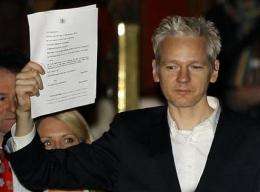Assange free from prison, back to leaking secrets

(AP) -- WikiLeaks founder Julian Assange was released on bail Thursday - confined to a supporter's 600-acre estate but free to get back to work spilling U.S. government secrets on his website as he fights Sweden's attempt to extradite him on allegations of rape and molestation.
The silver-haired Australian, who surrendered to British police Dec. 7, will have to observe a curfew, wear an electronic tag and report to police in person every day.
But there are no restrictions on his Internet use, even as U.S. authorities consider charges related to thousands of leaked diplomatic cables and other secret documents WikiLeaks has released. The site has released just 1,621 of the more than 250,000 State Department documents it claims to possess, many of them containing critical or embarrassing U.S. assessments of foreign nations and their leaders.
Assange emerged from London's neo-Gothic High Court building late Thursday following a tense scramble to gather the money and signatures needed to free him. Speaking under a light snowfall amid a barrage of flash bulbs, Assange - who's been out of the public eye for more than a month - told supporters he would pursue his efforts bringing government secrets to light.
"It's great to smell the fresh air of London again," he said to cheers from outside the court. "I hope to continue my work."
Assange ignored shouted questions from the assembled media. Later, BBC footage captured the 39-year-old riding in a white armored four-by-four outside the Frontline Club, a venue from journalists owned by his friend and supporter Vaughan Smith.
The broadcaster reported that Assange jumped upstairs for a celebratory cocktail at the bar, then went back outside and defended one of his most contentious releases - the publication of a worldwide list of sites that the U.S. considers critical to its national security. Officials in Washington decried the publication, saying it amounted to giving a hit list to terrorists.
Assange dismissed the criticisms, telling the BBC, "People in those countries have a right to know why they are of particular interest to the State Department."
Assange later headed to Ellingham Hall, Smith's 10-bedroom mansion about 120 miles (195 kilometers) northeast of central London.
While there, Assange will have to observe a curfew, wear an electronic tag and report to police every day.
The restrictions imposed by High Court Justice Duncan Ouseley amount to "virtual house arrest," WikiLeaks spokesman Kristinn Hrafnsson said. But he added that Assange can still use Smith's estate as a base for coordinating the publication of the leaked cables.
"There is a good Internet connection there," he noted.
The subject of whether Assange should have Internet access was never raised in court. WikiLeaks continued publishing documents even while Assange was in prison - including a new batch that hit the Web two hours ahead of his release.
"We have seen in the week I have been away that my team is robust," Assange told the BBC outside the Frontline Club. "It does show the resilience of the organization, that it can withstand decapitation attacks."
The publication of the cables has angered U.S. government officials, embarrassed allies and nettled rivals. The U.S. State Department says that international partners have curtailed their dealings with Washington as a result of the cable leaks, and have gone on the offense in a bid to limit the diplomatic fallout.
Assange insists that publishing the documents was essential to expose government wrongdoing. In particular, he has referred repeatedly to one cable that asked diplomats to gather information on United Nations staff such as their passwords, frequent flier numbers and even biometric information.
State Department officials say the cable originated from the U.S. intelligence community and deny Assange's contention that it ordered diplomats to spy. On Thursday, the U.S. ambassador to the United Nations in Geneva continued America's damage-control efforts over the document.
"I just want to assure everybody we're not collecting data on U.N. officials," Betty E. King told reporters in Geneva.
U.S. officials are investigating WikiLeaks and considering charges against Assange, a case that if pursued could end up pitting the government's efforts to protect sensitive information against press and speech freedoms guaranteed by the First Amendment. The government suspects WikiLeaks received the documents from an Army private, Bradley Manning, who is in the brig on charges of leaking other classified documents to the organization.
Assange was arrested not because of WikiLeaks, but because Swedish officials are seeking him for questioning on allegations stemming from separate encounters with a pair of women in Sweden over the summer. The women have accused Assange of rape, molestation and unlawful coercion. Assange denies the allegations, which his lawyers say stem from a dispute over "consensual but unprotected sex."
After his release, Assange said he will "continue to protest my innocence in this matter and to reveal, as we get it, which we have not yet, the evidence from these allegations."
Although Swedish officials insist the extradition effort has nothing to do with the WikiLeaks controversy, Assange's supporters say the timing of the allegations suggest that the case has been tainted by politics.
In Washington, State Department spokesman P.J. Crowley stressed that the U.S. has no involvement in Sweden's case. He said of Assange's release, "Perhaps that will put the conspiracy theories to bed once and for all."
The Swedish moves could complicate any potential U.S. effort to bring Assange to trial for revealing classified information. A U.S. extradition request would have to compete with the Swedish one, and the legal wrangling could drag on for months or years.
Swedish prosecutor Marianne Ny said the bail decision would not change the ongoing investigation in Sweden, and the extradition case would be handled by British authorities. Assange's next hearing is set for Jan. 11.
©2010 The Associated Press. All rights reserved. This material may not be published, broadcast, rewritten or redistributed.




















